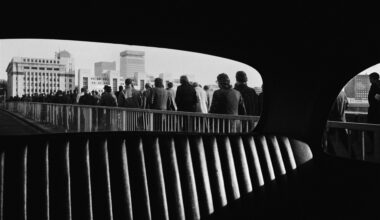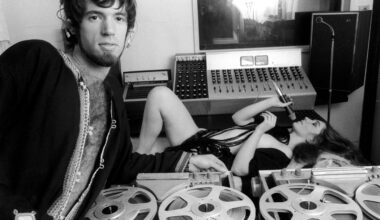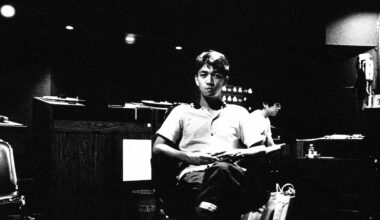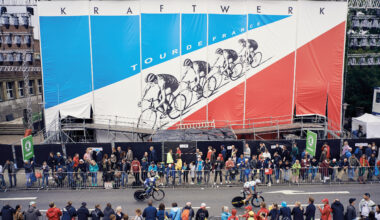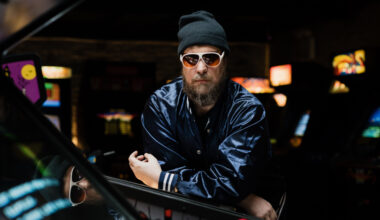On their new album ‘White Glue’, Wrangler have teased a groove-fuelled sound from their glorious vintage machines. the tight-knit trio talk old kit, new kit and why less is more
“It was a fucking long journey from you to Kylie Minogue that night,” laughs Stephen Mallinder, one third of Wrangler. He’s recalling a comment made by a friend following the band’s recent performance at the Royal Albert Hall as guests of John Grant, who was joined onstage by the timelessly adhesive Kylie for a duet on his hit ‘Glacier’. It’s hard to think of a more leftfield and electronic proposition than Wrangler to have been hosted within the booming, cavernous circles of such a venue. But they certainly weren’t overawed by the occasion, nor did it go to their heads. Rather than go for a giant screen backdrop, they filled the stage with TV screens.
“Instead of going big, we went really small,”explains Benge, antique synth collector and Wrangler percussionist, who is also known for his work with John Foxx. “Mind you, we had the full light show, which was really cool, they don’t normally do that for a support band.”
Wrangler laugh a lot. Stephen Mallinder is, always has been, a far more affable proposition in person than his icy, seething presence as Cabaret Voltaire vocalist suggested. And despite the nervy tautness of his latest outfit’s sound, as if on the edge of boiling and breaking point, there’s no tension whatsoever between the three of them as we chat away on the sofas in a coffee bar in Crouch End, the morning sunshine streaming in. Mal was the last to join the project, which was initially a duo of the equally cheery Benge and Phil Winter of the folktronic Tunng.
They laugh at and with each other; at Benge, when he’s not allowed to finish and clarify his thought that on the new album they explore “newer genres like disco”; they laugh when I comment on the terseness of the titles on the new album. “We don’t like to use too much ink when we’re doing the set lists,” says Mal. They laugh that I’m required to bring along my 11-month-old son to the interview, whose manic insomnia is only cured when I embark tangentially on a Keith Jarrett anecdote and he finally dozes off, jazz-bored, in my arms.
They laugh the way serious people do. They laugh with the absolute ease of electronic elders who know what they are about, what each other is about, know their way around the circuits and are fluent in negotiating electronic circuitry, navigating fresh pathways using decidedly old-fangled equipment, analogue, modular systems of a certain vintage, but still humming with warm juice.
“It’s the technology that other people have discarded or forgotten, even while there’s so much potential left in it,” says Mallinder.
“Although it wasn’t so much rejected as displaced,” adds Benge.“Electronic music as a genre regenerates a lot quicker than others do. Rock bands have been using the same instruments and technology since the 1960s. Funny, I’ve been using analogue synths since the 80s, but people were never interested in preserving or collecting them back then, people always wanted the latest or most convenient thing.”
Electronic music used to be synonymous with futurism, but that’s no longer the case. Now it is both haunted and inspired by its own past, its unfulfilled dreams and thwarted ideals. It is more often to be found dwelling on 1960 and Joe Meek’s ‘I Hear A New World’ outer space utterings than thinking about year 2060. Plus, there is the factor of “built in obsolescence” when it comes to the hardware of electronic music, in which new products are deemed to have a limited shelf life as new trends and fashions accelerate. This has led to older technologies being discarded before their time.
“The idea of wanting what everyone else has got, that’s like capitalism,” says Mallinder. “Whereas the idea of wanting a better way of doing things, for better worlds, represents a sort of ideology, or utopianism. It translates into making music, where you reject the same old rock thing, or plug-ins, and instead find better ways of doing it. You’re applying that sense of idealism.
“There’s also the aesthetic. There’s a beauty in those old machines. I was watching ‘Escape From New York’ last night and it has these wonderful neon colours to represent Manhattan. There’s a whole aesthetic with synths and modular stuff, right down to the fonts. It was from a time when people made things, they weren’t just cobbled together and put in a black box. A lot of people probably have synths in their living rooms, a display thing.”
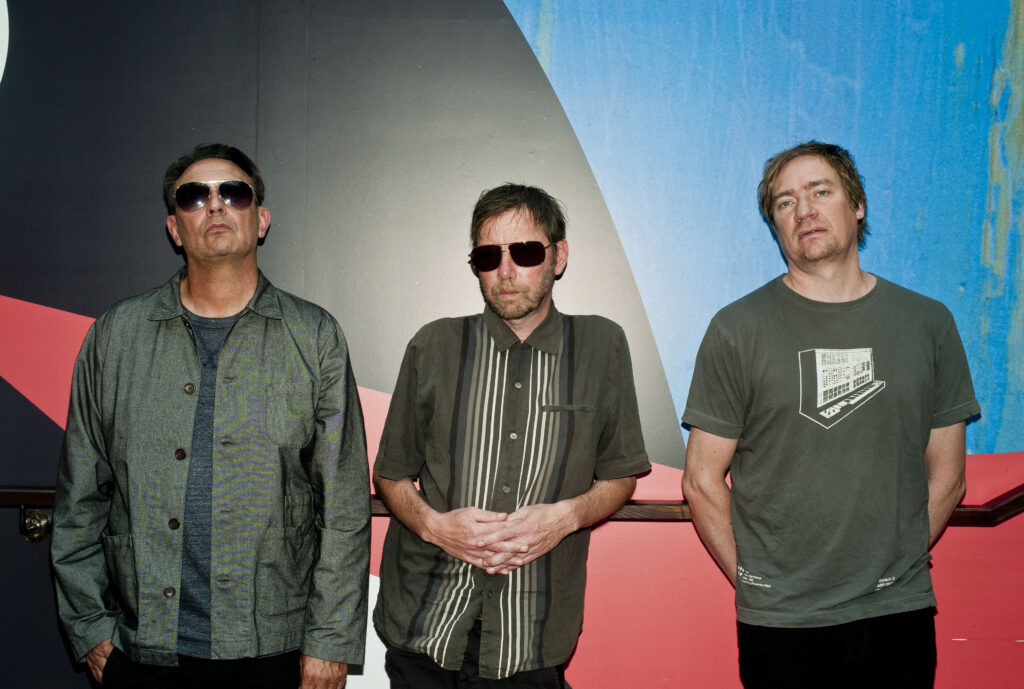
Wrangler’s new album, ‘White Glue’, represents an upgrade of sorts on their excellent debut, ‘LA Spark’. More streamlined, more honed and gleaming, it’s the result of focussed and intensive sessions at Benge’s studio (which has recently been relocated from East London to Cornwall) and road-testing the tracks live.
“For me, it’s having the confidence to do less,” says Winter. “To be more minimal, less jamming, see how that affects the crowd.”
The record’s sleeve features an inflated acid house smiley face spattered in black ink, and lyrically the album is antithetical to the chemically induced happy-clappy fervour of 1988. And yet, Wrangler wear a smile of their own; smiles shouldn’t be the preserve of the inanely optimistic, a sentiment with which Mallinder heartily agrees. The Wrangler smile is borne from a love of the work, of the uneasy routes they take in these songs, the new shapes they bend from the old, like a TV aerial sculpture, the sense of renewal through revisitation, of chance discoveries on temperamental machinery.
“With an old synth, the first idea is usually an accident from which you build,” says Winter.
“When things are perfect it’s pretty fucking boring,” agrees Mal.
A certain spirit of the Cabs’ heyday pervades ‘White Glue’, shot through with contributing guitars from Julie Campbell, aka Lonelady, a modern day carrier of the post-punk torch. If every Cabaret Voltaire track felt like a four-minute warning, Wrangler bristle with an abundance of fresh, anti-nostalgic permutations wrought from the antique. Today, Mallinder is an unnervingly youthful looking 61, working in part as an academic and lecturer at Brighton University. I wonder how his music sits with the current studio generation and their more immersive relationship with technology.
“Actually, we got the students to do a remix,” says Mal. “There were some really interesting results. One guy translated all the sound into pure data and built another track altogether, one that had no sonic resemblance to the original track.
“There’s a massive fascination with the world we come from. Their terms of reference are house, acid; slightly different from ours. But they’ve come from a world of plug-ins, they see a massive authenticity in what we do. They were given a breakdown of the equipment we used to record with and we talked through some of the processes, the fact that the album was made in a studio captivates them. It’s a mystery to them. It’s ‘proper music’.”
One of the attractions of seeing Wrangler live is that they present a very physical spectacle of work being done, wrought from equipment that looks like it might fight back. It’s the antithesis of the less inspiring onstage sight of chaps bathed in the light of their own laptops.
“The first time I saw that it absolutely fascinated me,” laughs Winter. “’What’s he doing behind there?’.”
But how do Wrangler crowds compare with the crowds of yesteryear?
“It seemed there were a lot of people coming down to see Mal and because we played a few Cabs tunes, which we don’t do any more,” says Benge. “But now I think people are coming along out of curiosity or to see us for our own sake.”
“One thing I noticed from having played at Latitude this year is that crowds these days are made up of very young people and older people,” says Mal. “People between 18 and 28 don’t go. That seems to be the demographic of the gig-going public.”
Is “synthophobia” (the suspicion that electronic keyboard instruments are soulless and inauthentic) extinct among the young? A relic of an older mentality?
“I think in the last five years it’s gone the other way,” says Benge. “A band is actually expected to have synthesisers. If a band just goes up and plays guitars, people wonder when the synth bassline is coming.”
“It’s an expected part of the armoury,” adds Mal. “Every band has a token synth. The day the world stopped turning is when Coldplay put that picture up of their modular synth and I was thinking, ‘Take that down immediately’.”
‘White Glue’ follows hot on the heels of the recently released ‘Sparked: Modular Remix Project’, in which guests including Daniel Miller, Abul Mogard, Scanner and Chris Carter were invited to rework tracks from the first Wrangler offering on the caveat that they used “just one analogue modular synthesiser system of your choice.” From Mogard’s mournfully cloudy take on ‘Mus IIC’ to Daniel Miller’s electropop-ish vehicular take on ‘Theme From Wrangler’ to the band’s own lengthy ‘Theme Meme’, the album is a formidable array of current analogue practice. As Mal says, “It was intended to showcase the full modular range: it’s the last word.”
Or maybe evidence of a continuing, ongoing conversation between man and machine, even machine and machine. Because, as Wrangler are aware, the machines do talk.
“Definitely,” says Benge, the synth collector, like a loving zookeeper. “You have to let the machines do their thing. Let them talk to each other. They do stuff by themselves sometimes and you have to be open to that.”
‘White Glue’ is released by MemeTune
